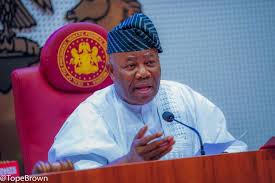Senate President Godswill Akpabio has stated that the reintroduced national anthem, “Nigeria, We Hail Thee,” could have played a significant role in preventing banditry and insecurity if it had been retained.
Speaking at the Nigeria Institute of Legislative and Democratic Studies in Abuja on Tuesday, June 18, Akpabio highlighted the anthem’s potential to foster unity, patriotism, and love among Nigerians.
The old national anthem, “Nigeria, We Hail Thee,” was abolished in 1978 by then-President Olusegun Obasanjo but was reintroduced by President Bola Tinubu in May 2024.
READ ALSO: JUST IN: Senate Passes Bill To Reinstate Old National Anthem
Akpabio addressed critics who label the reintroduced anthem as a colonial relic, arguing that they misunderstand the country’s history and legal context.
He pointed out that a panel of Nigerians was established in 1959 to gather global input on the anthem, which was then approved.
“The other impactful bill signed by the National Assembly is reverting to our old national anthem. A lot of people are not aware that there was a panel set up and made up of Nigerians to receive input from all over the world in 1959.
READ ALSO: NOA Unveils Reintroduced National Anthem Approved Lyrics
So when people say we’re bringing in a colonial anthem, they need to look into the history of ‘Nigeria, We Hail Thee.’ If we had kept to that anthem, we probably would not have banditry today in Nigeria because if you take your neighbour as your brother, you will not want to kill him,” Akpabio explained.
In addition to discussing the anthem, Akpabio revealed that over 30,000 Nigerian students have been selected to benefit from a newly introduced student loan scheme.
The Senate President emphasized that the Student Loan Bill, passed by the tenth Assembly, aims to enable children of the poor and underprivileged to pursue higher education without financial burden.
READ ALSO: FG Agency Gives Staff Three-Day To Learn New National Anthem
“One of the most important bills for the tenth Assembly was the bill sent to us by President Bola Tinubu.
The bill enables vulnerable Nigerian students, the less privileged, to obtain higher education. As I speak to you now, over 30,000 Nigerian students have already been selected to benefit from that scheme. That is one of the bills I will say appeal to me the most,” Akpabio said.

